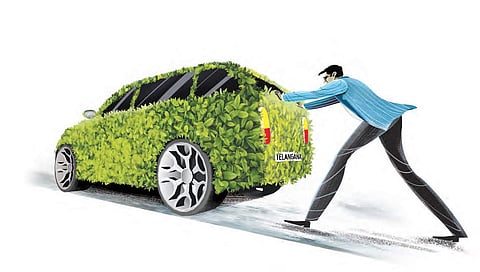

HYDERABAD: For faster adoption of Electric Vehicles (EVs), the State must focus on ensuring a policy framework that helps bring down manufacturing costs and incentives for customers. With Telangana preparing to release its EV policy by June end, here is a look at what the industry has to say.
Both, the EV and the battery makers, want to see GST reduced for two to three years till a local ecosystem is in place. EVs are presently taxed at 12 per cent GST and batteries sold without the vehicle come under the 28 per cent slab. TS had in 2017 come up with a draft policy on EVs and the final policy is expected to be released by June end. The State government has also invited stakeholders to give feedback on the quantum and duration of incentive to be given.
“For a vast majority of people, buying a personal vehicle is a huge task. The easier option is to buy a second-hand vehicle,” said Chandu Kumar Potti, MD and chief executive of Versatile Auto components, Hyderabad. “If I have to release EVs in the low-cost bracket, I have to keep the cost low on the battery manufacturing side,” he added.
“Creating a fund corpus by the State or Centre would encourage Indian firms to invest more in R&D. The policy drafting should encourage better transfer of technology to Indian companies which will increase the technology capability of EV firms,” said Rajesh, chief operating officer, ETrio Automobiles, Jubilee Hills.
One such measure the state can adopt is to create a Carbon credit policy system for EV manufacturers, along the lines of the Chinese electric vehicle policy. The credits could be directly proportional to the number of vehicles manufactured.
However, some are sceptical about the policy. “What can we expect from state policy? The draft policy was a joke,” said a veteran in battery manufacturing. “Nothing drastic is going to happen, the policy will be just a small push. There are technical issues that need fixing,” he added.
How the Chinese did it 2020
EVs are exempt from purchase tax till then. There is also a consumer subsidy programme. The subsidies cover about 40 to 60 per cent of the EV cost
“Dual-credit policy,” will impose compulsory targets for vehicle manufacturers starting from 2019.
Manufacturers will be assessed based on the fuel consumption and production cut offs to qualify for energy credits. To obtain these new energy credits, manufacturers will need to produce a minimum number of EVs, and the number of credits they receive will be based on factors such as driving range and EV weight. The policy mandates that 10 per cent of a vehicle manufacturer’s total credits must consist of new energy credits in 2019 and 12 per cent in 2020
Incentives to EV buyers: free parking, faster license plate acquisition and lower fees, allowed to use bus lanes
12,000: China intends to build that many charging stations by 2020, which can accommodate five million EVs. Installing charging stations via subsidies. The most generous subsidy could reach 30 per cent of the total investment
Source: Environmental and Energy Study Institute: Comparing U.S. and Chinese Electric Vehicle Policies